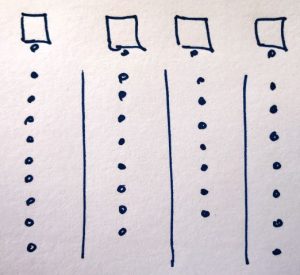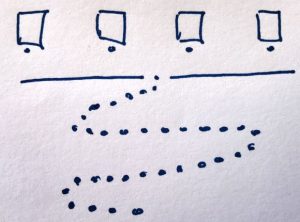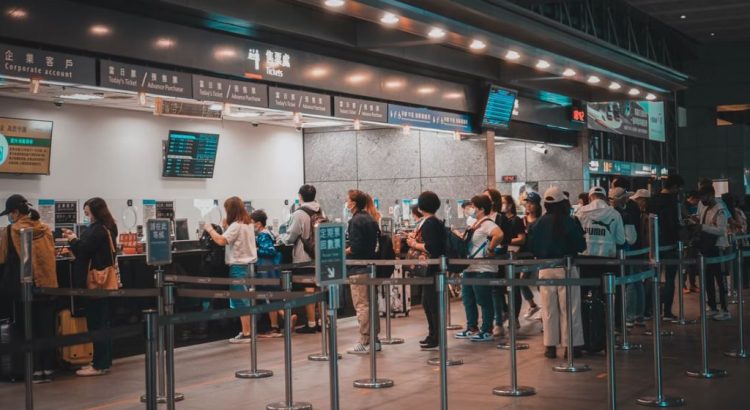Many organizations have policies that force work to be assigned as early as possible. For many support organizations there is a goal that stipulates a maximum response time to customer inquiries.
Unfortunately, there is a common misunderstanding here: the rule of reacting as quickly as possible to a customer request does not also mean assigning the agent early.
Effects
The following effects result from this:
- From distributor’s point of view, the problem is quickly resolved. Now it is clear who has to take care of it. (I call this the “hot potato approach”)
- From the agent’s point of view: She has to interrupt other work to take care of the new customer request. Ideally, it can be solved immediately. In the worst case, the request cannot be resolved by the agent or cannot be resolved alone. In any case, she now has one more activity in her queue. And maybe this won’t even become transparent. The agent’s pressure increases.
- From the customer’s point of view: An agent has responded. In case of doubt, however, she is not the correct agent for processing or, after an initial admission, she has no time for further processing. This means that the customer may have to wait a long time.
A useful metaphor: cash register queues
We all hate standing in a queue at the till. The fastest queue seems to be the shortest. But how often it turns out that other queues are faster because complex customer processes take place in our own queue. Switching to another line is not possible or does not make sense. It feels unfair and it is!
This cash register principle corresponds to that of early allocation.

It is much fairer to stand in a common line and distribute the customers directly in front of the cash registers. If a longer process blocks a checkout, subsequent customers go to another checkout that was released earlier.
This cash register principle corresponds to that of late allocation.

In the example of supermarket checkouts presented, we assume two basic preconditions:
- Every cash register is the same; i.e. in principle, every customer can be served at every cash register.
- All customers are treated equally; i.e. the principle of “first come – first serve” applies.
Specialization as an additional challenge
It is now more difficult for specialized agents if every problem has to be dealt with by another specialist. If exactly one agent is available for each discipline and this can also be identified quickly and clearly, we are back at the entrance situation. The question now arises: Is there really only one expert who also has to process this customer request? Shouldn’t we have several experts on one topic for reasons of reliability? Because what happens when an expert is on vacation, sick, retires or leaves for other reasons? It is certainly better to have agents in an emergency who can at least provide basic assistance or who can help, even if it takes longer.
The customer’s direct contact with the specialist is just as problematic. Even if this seems to be very simple and good for customers, the specialist / agent is always torn out of her current work by a direct email or a direct call, so that after a certain extent, no coherent work is possible.
A sensible approach
It therefore makes sense to collect and analyze all inquiries centrally (first level support) and have them in a list (also known as a backlog) and then inform the customer about the status. The experts can pull customer inquiries from the backlog, which they can process (pull principle). If the specialist is not available for an urgent request, the most suitable agent will take care of it by pulling the request. The remaining challenge is that of the “analysis”.
Triage
Triage is a good technique to tackle this challenge. Triage is a term from emergency medicine, whereby the patients are divided into three categories by a very quick analysis:
- The patient is injured so badly that despite immediate measures, it is unlikely that he will survive.
- The patient is injured so badly that he will not survive or suffer sustained damage without immediate action.
- The patient is more easily injured and does not need to be treated immediately.
Clearly, the most urgent are category 2 patients.
Back to our customer inquiries: We need a few clear criteria and corresponding triage questions and we need a few employees who do nothing but accept the customer inquiries and evaluate them according to the triage criteria. This “first level support” focuses on acceptance and analysis and ideally can solve the problem directly. Otherwise, the request, enriched with the appropriate attributes, is routed to the backlog.
Service-Level-Agreements (SLA)
Now we can also address the fact that all customers are treated equally in a single queue. We can even make money with it! The more important a customer is or the more he has paid for a fast service, the higher up his request is placed in the backlog.
[Title picture from @hobiindustri on unsplash.com]
